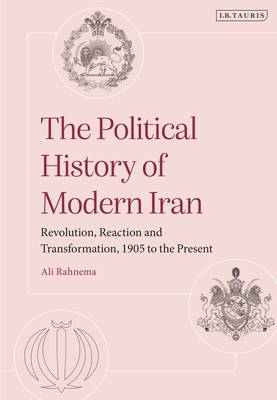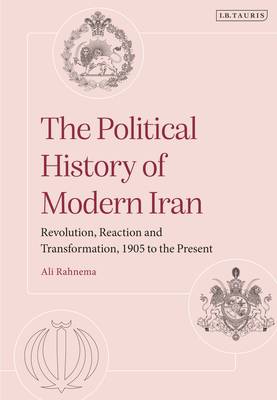
Bedankt voor het vertrouwen het afgelopen jaar! Om jou te bedanken bieden we GRATIS verzending (in België) aan op alles gedurende de hele maand januari.
- Afhalen na 1 uur in een winkel met voorraad
- In januari gratis thuislevering in België
- Ruim aanbod met 7 miljoen producten
Bedankt voor het vertrouwen het afgelopen jaar! Om jou te bedanken bieden we GRATIS verzending (in België) aan op alles gedurende de hele maand januari.
- Afhalen na 1 uur in een winkel met voorraad
- In januari gratis thuislevering in België
- Ruim aanbod met 7 miljoen producten
Zoeken
The Political History of Modern Iran
Revolution, Reaction and Transformation, 1905 to the Present
Ali Rahnema
Hardcover | Engels
€ 169,95
+ 339 punten
Uitvoering
Omschrijving
From the rise of constitutionalism during the rule of despotic Qajars, foreign invasions, the Pahlavi regimes' destructive politics, economic, cultural and social modernization efforts and the oil nationalization movement, to the Iranian Revolution, its high hopes, broken promises, repression and intolerance causing national discontent and another socio-political upheaval today, the history of modern Iran has been eventful, unstable and turbulent.
In this textbook, Ali Rahnema draws on his experience teaching and researching on modern Iran to render one hundred years of modern Iranian politics and history into easy-to-follow episodic chapters. Step by step, and taking a chronological approach, students are given the core information, analysis, and critical assessment to understand the flow of contemporary Iranian history.
This is a comprehensive and exhaustive guide for undergraduate and graduate level courses on modern Iranian history and politics. The textbook is complete with the following pedagogical features:
* An initial chapter on how to study Iranian history and how to approach historiography
* Images of key individuals discussed in each chapter
* Text boxes throughout to highlight key episodes, concepts, and ideas
*Three types of exam questions; factual and analytical, seminar, and discussion at the end of each chapter
* Glossaries at the end of each chapter
*A comprehensive timeline
Topics covered include: party formations; the flourishing of the press; the expansion or reduction of political and civil rights; repression and human right abuses; foreign intervention and influence; obsessions over conspiracies; the influence of Western ideologies, the role of nationalism, cultural and historical Persian chauvinism; and Shi'i Islam and competing Shiisms.
In this textbook, Ali Rahnema draws on his experience teaching and researching on modern Iran to render one hundred years of modern Iranian politics and history into easy-to-follow episodic chapters. Step by step, and taking a chronological approach, students are given the core information, analysis, and critical assessment to understand the flow of contemporary Iranian history.
This is a comprehensive and exhaustive guide for undergraduate and graduate level courses on modern Iranian history and politics. The textbook is complete with the following pedagogical features:
* An initial chapter on how to study Iranian history and how to approach historiography
* Images of key individuals discussed in each chapter
* Text boxes throughout to highlight key episodes, concepts, and ideas
*Three types of exam questions; factual and analytical, seminar, and discussion at the end of each chapter
* Glossaries at the end of each chapter
*A comprehensive timeline
Topics covered include: party formations; the flourishing of the press; the expansion or reduction of political and civil rights; repression and human right abuses; foreign intervention and influence; obsessions over conspiracies; the influence of Western ideologies, the role of nationalism, cultural and historical Persian chauvinism; and Shi'i Islam and competing Shiisms.
Specificaties
Betrokkenen
- Auteur(s):
- Uitgeverij:
Inhoud
- Aantal bladzijden:
- 744
- Taal:
- Engels
Eigenschappen
- Productcode (EAN):
- 9780755643981
- Verschijningsdatum:
- 7/09/2023
- Uitvoering:
- Hardcover
- Formaat:
- Genaaid
- Afmetingen:
- 170 mm x 244 mm
- Gewicht:
- 1365 g

Alleen bij Standaard Boekhandel
+ 339 punten op je klantenkaart van Standaard Boekhandel
Beoordelingen
We publiceren alleen reviews die voldoen aan de voorwaarden voor reviews. Bekijk onze voorwaarden voor reviews.









